Vitamin E, a crucial nutrient in human health, is often overshadowed by more prominent vitamins. However, its role is no less significant. As a powerful antioxidant, Vitamin E protects cells from oxidative stress, a factor in ageing and chronic diseases. For vegetarians, who exclude meat – a common source of various nutrients – ensuring sufficient Vitamin E intake becomes even more essential. This article aims to shed light on the importance of Vitamin E-rich foods for Vegetarians, particularly those following a vegetarian lifestyle. We will explore its benefits, dietary sources, daily requirements, and the potential need for supplements. This comprehensive guide will provide vegetarians with the knowledge to maintain optimal health while navigating the intricacies of a plant-based diet.
Understanding Vitamin E-Rich Foods for Vegetarians – Its Importance and Benefits
Vitamin E, a collective term for eight fat-soluble compounds, primarily functions as an antioxidant. Alpha-tocopherol, the most well-known of these compounds, is vital for its protective properties against lipid peroxidation in cell membranes. The body’s defence against free radicals, harmful byproducts of metabolism and environmental factors, is significantly bolstered by Vitamin E. Its antioxidant nature contributes to skin health, guarding against UV damage and premature ageing.
Moreover, Vitamin E is pivotal in enhancing immune function and maintaining cardiovascular health. It prevents the oxidation of low-density lipoprotein (LDL) cholesterol, a critical factor in the development of atherosclerosis. For vegetarians, relying on a plant-based diet makes understanding and sourcing Vitamin E essential, ensuring they reap these health benefits while adhering to their dietary choices.
17 Top Vitamin E-Rich Foods for Vegetarians
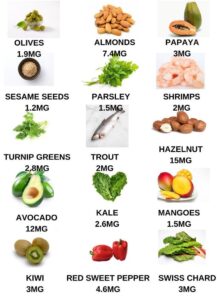
Nuts and Seeds: Powerhouses of Vitamin E
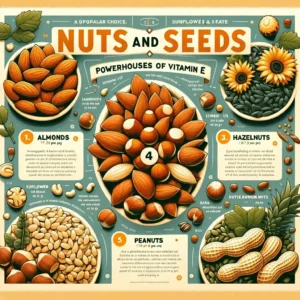
- Almonds: A popular choice, offering about 7.3 mg of Vitamin E per ounce.
- Hazelnuts: Rich in Vitamin E and a great addition to cereals and desserts.
- Sunflower Seeds: A versatile snack that can be added to salads or yoghurts.
- Pine Nuts: Ideal for pestos and salads, providing a good amount of Vitamin E.
- Peanuts: Easily available and a tasty source of Vitamin E.
Plant-Based Oils: Essential Sources of Vitamin E
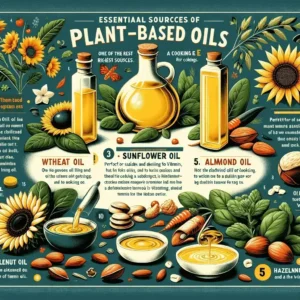
- Wheat Germ Oil: One of the richest sources, ideal for dressings and sauces.
- Sunflower Oil: A cooking oil that’s high in Vitamin E.
- Olive Oil: Perfect for salads and low-heat cooking, it’sit’s a healthy source of Vitamin E.
- Almond Oil: A flavorful option for cooking and salad dressings.
- Hazelnut Oil: Adds a nutty flavour to dishes and a Vitamin E boost.
Fruits and Vegetables: Natural Vitamin E Contributors
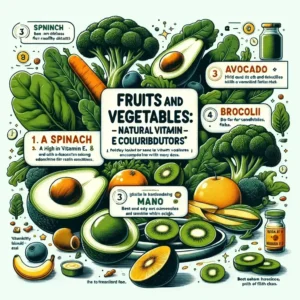
- Spinach: A versatile vegetable, easily incorporated into many dishes.
- Avocado: High in Vitamin E and healthy fats, perfect for sandwiches and salads.
- Broccoli: Best eaten steamed or raw to retain its Vitamin E content.
- Kiwi: A fruity source of Vitamin E, great in smoothies or fruit salads.
- Mango: Delicious and rich in Vitamin E, perfect for desserts or as a snack.
Grains and Legumes: Unexpected Vitamin E Sources
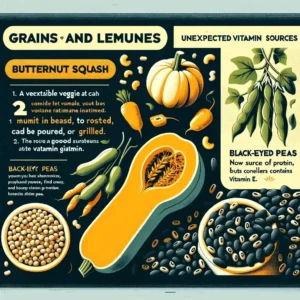
- Butternut Squash: A versatile veggie that can be roasted, pureed, or grilled.
- Black-Eyed Peas: Not only a good source of protein but also contains Vitamin E.
Each of these foods brings its unique flavour and nutritional profile, making them essential in a vegetarian diet for a balanced Vitamin E. From crunchy nuts and seeds to flavorful oils and fresh fruits and vegetables, the options are diverse and adaptable to various cuisines and meal plans. Incorporating these ingredients into daily meals enhances the overall nutrient content and adds to the culinary diversity of vegetarian diets.
Daily Vitamin E Requirements
The Recommended Dietary Allowance (RDA) for Vitamin E varies with age and gender. Adults require 15 mg/day, with increased needs during pregnancy and lactation. Tracking daily intake is vital, especially for vegetarians, to ensure these requirements are met. Dietary planning and awareness of Vitamin E content in foods are essential strategies for vegetarians.
Incorporating Vitamin E into Your Vegetarian Diet
Practical strategies to include Vitamin E-rich foods in a vegetarian diet involve diversity and creativity in meal preparation. Simple recipes like spinach salads with sunflower seeds or avocado toast can significantly boost Vitamin E intake. Cooking methods also play a role; for instance, using olive oil in low-heat cooking can preserve the Vitamin E content.
Vitamin E Supplements – Necessity and Selection
While a well-planned vegetarian diet can meet Vitamin E needs, certain situations require supplements. When choosing a supplement, looking for natural Vitamin E (d-alpha-tocopherol) and adhering to recommended dosages is essential. Vegetarians should be aware of potential interactions with medications, like blood thinners, and consult healthcare providers before starting any supplement regimen.
Potential Health Risks and Interactions
Excessive intake of Vitamin E, particularly from supplements, can lead to toxicity, with symptoms like nausea and hemorrhagic stroke. Interactions with medications, including blood thinners and cholesterol-lowering drugs, are also a concern. These risks highlight the importance of moderation and professional guidance in supplement use.
FAQs about Vitamin E-Rich Foods for Vegetarians
Can vegetarians get enough Vitamin E from their diet?
Yes, a well-planned vegetarian diet can provide adequate Vitamin E.
How does cooking affect the Vitamin E content in foods?
High temperature and prolonged cooking can reduce Vitamin E levels. Opt for raw or lightly cooked preparations to retain this nutrient.
Pros and Cons of a Vitamin E-Rich Vegetarian Diet
Pros:
- Enhanced immune function.
- Antioxidant protection for skin and overall health.
Cons:
- Limited food sources for Vitamin E.
- Potential challenges in nutrient absorption.
Conclusion
A balanced approach to nutrition is vital for vegetarians, especially regarding Vitamin E intake. Vegetarians can successfully meet their Vitamin E needs by combining dietary sources with supplements when necessary. The importance of this nutrient in a vegetarian diet cannot be overstated, underscoring the need for informed nutritional choices and supplementation when required.


